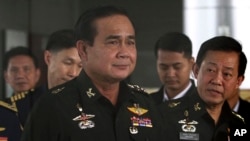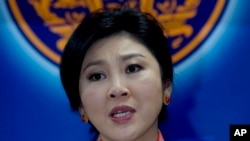Amnesty International says a team of four from its headquarters in London traveled to Thailand to research the human rights situation in the kingdom following the May 22 coup.
The non-governmental organization’s investigators, who were in Thailand for nine days this month - from July 9 to 18 - met with a deputy chief of staff of the army, representing the National Council for Peace and Order. The NCPO is the ruling military entity that seized power from the caretaker civilian government.
Amnesty International spokesman Olof Blomqvist says the human rights organization appreciated the willingness of the junta to engage with
its representatives and answer their questions for an upcoming report.
“We have serious concerns about the human rights situation in Thailand since the military takeover," Blomqvist explained. "And in this report that is coming out over the next few weeks I think we will spell out those concerns more clearly.
"And we will also have some strong recommendations towards the NCPO that we will hope that they will take on board on how they can better fulfill their international human rights obligations," he added.
Thailand’s state run news agency (NNT) characterizes the meeting as providing Amnesty International with a “better understanding of the situation in Thailand” and said the organization’s representatives “became more positive towards the operation of the NCPO with regard to human rights.”
Amnesty and other organizations have expressed concern about the military’s crackdown on migrant workers from neighboring countries: Cambodia, Myanmar, Laos and Vietnam. Fears among foreign laborers, after the coup, prompted a hurried temporary exodus by more than 100,000 Cambodians.
The junta has also faced international criticism for repression of Thai citizens under a continuing period of martial law. Military decrees have imposed serious restrictions on rights and as well as freedom of expression by academics, journalists and members of the public.
Hundreds of Thais have been summoned for interrogation and detained. Most have been released after about one week in custody.
May 22 coup
The coup occurred following an extended and sometimes violent period of political instability.
The electorate has been polarized for more than a decade.
Royalists among the Bangkok middle class and elite, including the so-called yellow shirts, have strongly opposed the countryside red shirt majority that in every election this century has propelled into the prime minister’s seat candidates supported by billionaire businessman Thaksin Shinawatra.
He was deposed as prime minister in a coup in 2006. His younger sister, Yingluck Shinawatra, was forced out of the same job this year shortly before the military takeover.
Interim charter
The junta last week unveiled an interim charter after abrogating the country’s constitution. It says it plans to write a new permanent constitution soon and appoint a legislature, which will include military officers.
Army chief, General Prayuth Chan-ocha, has said he hopes national elections can be held around October next year, after he carries out sweeping political and other reforms.
Coup leaders and its supporters have made no secret of their desire to create a new political system that will permanently eradicate the influence of the Shinawatra clan.








